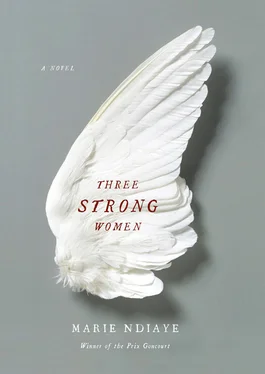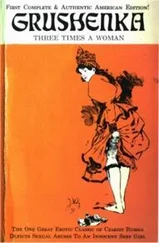
 W HEN HER HUSBAND’S parents and sisters told her what was expected of her, what she was going to have to do, Khady knew already.
W HEN HER HUSBAND’S parents and sisters told her what was expected of her, what she was going to have to do, Khady knew already.
She hadn’t known what form their wish to get rid of her would take, only that the day would come when she’d be ordered to leave, that much she’d known or gathered or felt (that is to say, before tacit understanding and unexpressed feelings had gradually established knowledge and certainty) from the earliest months of her settling in with her husband’s family following his death.
She remembered her three years of marriage not as a time of serenity, because the longing, the terrible desire for a child, had made each month a frantic climb toward a possible blessing, then, when her period came, a collapse followed by gloomy despondency before hope returned and, with it, the gradual, dazzling, breathless ascent day after day, right up to the cruel moment when a barely perceptible pain in her lower abdomen let her know that it hadn’t worked this time — no, those years had certainly been neither calm nor happy, because Khady never did get pregnant.
Still, she thought of herself as a string stretched to the limit, strong, taut, vibrating in the impassioned confinement of these expectations.
It seemed to her that she’d not been able to concentrate on anything, throughout those three years, other than on the rhythmic alternation of hope and disillusionment, so that disillusionment — provoked by a twinge in her groin — might quickly be followed by the stubborn, almost ridiculous surge of hope regained.
“It’ll perhaps be next month,” she would say to her husband.
And, careful not to show his own disappointment, he would reply in a kindly way, “Yes, for sure.”
Because that husband of hers had been such a nice man.
In their life together he’d given her full latitude to become that desperately taut string that resonated with every emotion, and he’d surrounded her with kindness, always speaking to her with prudence and tact, exactly as if, busy with creating a new life, she needed to be surrounded by an atmosphere of silent deference in order to be able to perfect her art and give form to her obsession.
Never once had he complained about the overwhelming presence in their life of the baby that never got conceived.
He’d played his part rather selflessly, she said to herself later.
Wouldn’t he have been within his rights to complain about the inconsiderate way she pulled him toward her or pushed him away at night, depending on whether she thought her husband’s semen would be of any use at that moment, about the way, during her non-ovulating period, she made no bones about not wanting to make love, as if the expenditure of useless energy could damage the only project she then cared about, as if her husband’s seed constituted a unique, precious resource of which she was the keeper and which should never be squandered in the pursuit of mere pleasure?
He’d never complained.
At the time she hadn’t seen how noble his behavior was because she wouldn’t have understood that he could have complained about — or even simply rejected the legitimacy, necessity, and nobility of — the asceticism (ascetic only in a sense, since their tally of sexual encounters was impressive) that this mania to have a child subjected them.
No, for sure, she wouldn’t have understood that at the time.
It was only after the death of her husband, of the peaceable, kindly man she’d been married to for three years, that she was able to appreciate his forbearance. That only happened once her obsession had left her and she’d become herself again, rediscovering the person she’d been before her marriage, the woman who’d been able to appreciate the qualities of devotion and gallantry that her man possessed in abundance.
She then felt a great unhappiness, remorse, hatred almost, about the mad desire to get pregnant that had blinded her to everything else, in particular her husband’s illness.
Because must he not have been ill for some time to die so suddenly, early one pale morning during the rainy season? He’d scarcely gotten out of bed that day to open as usual the little café they ran in a lane in the medina.
He’d got up and then, with a sort of choking sigh, almost a muted sob, a sound as discreet as the man himself, he collapsed at the foot of the bed.
Still in bed herself and barely awake, at first Khady hadn’t imagined that her husband was dead, no, not for a second.
For a long time she would blame herself about the thought that had flashed through her mind — oh, a year or more later, she was, actually, still angry with herself — about this thought: Wouldn’t it be just their rotten luck if he fell ill just at that moment, a good two weeks after her period, with her breasts feeling slightly harder and more sensitive than usual, leading her to suppose she was fertile, but if this man was so unwell as to be incapable of making love to her that evening, what a mess, what a waste of time, what a horrid letdown!
She’d gotten up in her turn and gone over to him, and when she’d realized he was no longer breathing but just lying there inert, hunched up, his knees almost touching his chin, with one arm trapped under his head and with one innocent, vulnerable hand lying flat, palm upward, on the floor, looking, she’d said to herself, like the child he must have been, small and brave, never contrary but open and forthright, solitary and secretive under a sociable exterior, she’d seized his open palm and pressed it to her lips, tortured at the sight of so much decency in one human being. But even then stupefied grief was battling it out in her heart with an unabated, undeflated exultation at the thought that she was ovulating, and at the same moment as she was running to get help, diving into the house next door, unaware of the tears pouring down her cheeks, that part of her still obsessed with pregnancy was beginning to wonder feverishly what man could, just this once, step in for her husband to avoid missing the chance to get pregnant this month and break the exhausting cycle of hope and despair that, even as she ran shouting that her husband was dead, she saw looming, were she forced to pass up this opportunity.
And as her reason returned, and it began to dawn on her that this fertile period would be wasted, and likewise the months to follow, a huge disappointment — a feeling that she’d put up with all that (hope and despair) for three whole years to no purpose — contaminated her grief at this man’s death with an almost rancorous bitterness.
Couldn’t he have waited for two or three days?
Such thoughts did Khady still, now, reproach herself for having entertained.
After her husband’s death the owner of the café threw her out to make way for another couple, and Khady had had no choice but to go and live with her husband’s family.
Her own parents had handed her over to be brought up by her grandmother, long since dead, and after not seeing them during her childhood for long stretches, Khady had finally lost touch with them altogether.
And although she’d grown up to be a tall, well-built, slender young woman with a smooth oval face and delicate features, although she’d lived for three years with this man who’d always had a kind word for her, and although she’d managed, in the café, to command respect with an attitude that was unconsciously haughty, reserved, a little frosty, and thereby preempt any taunts about her infertility — despite it all, her lonely, anxious childhood, and later her vain efforts to get pregnant, which, while suspending her in an intense, almost fanatical emotional state, had all dealt their barely perceptible but fatal blows to her precarious self-esteem: all that had conditioned her to find humiliation not in the least abnormal.
Читать дальше


 W HEN HER HUSBAND’S parents and sisters told her what was expected of her, what she was going to have to do, Khady knew already.
W HEN HER HUSBAND’S parents and sisters told her what was expected of her, what she was going to have to do, Khady knew already.










